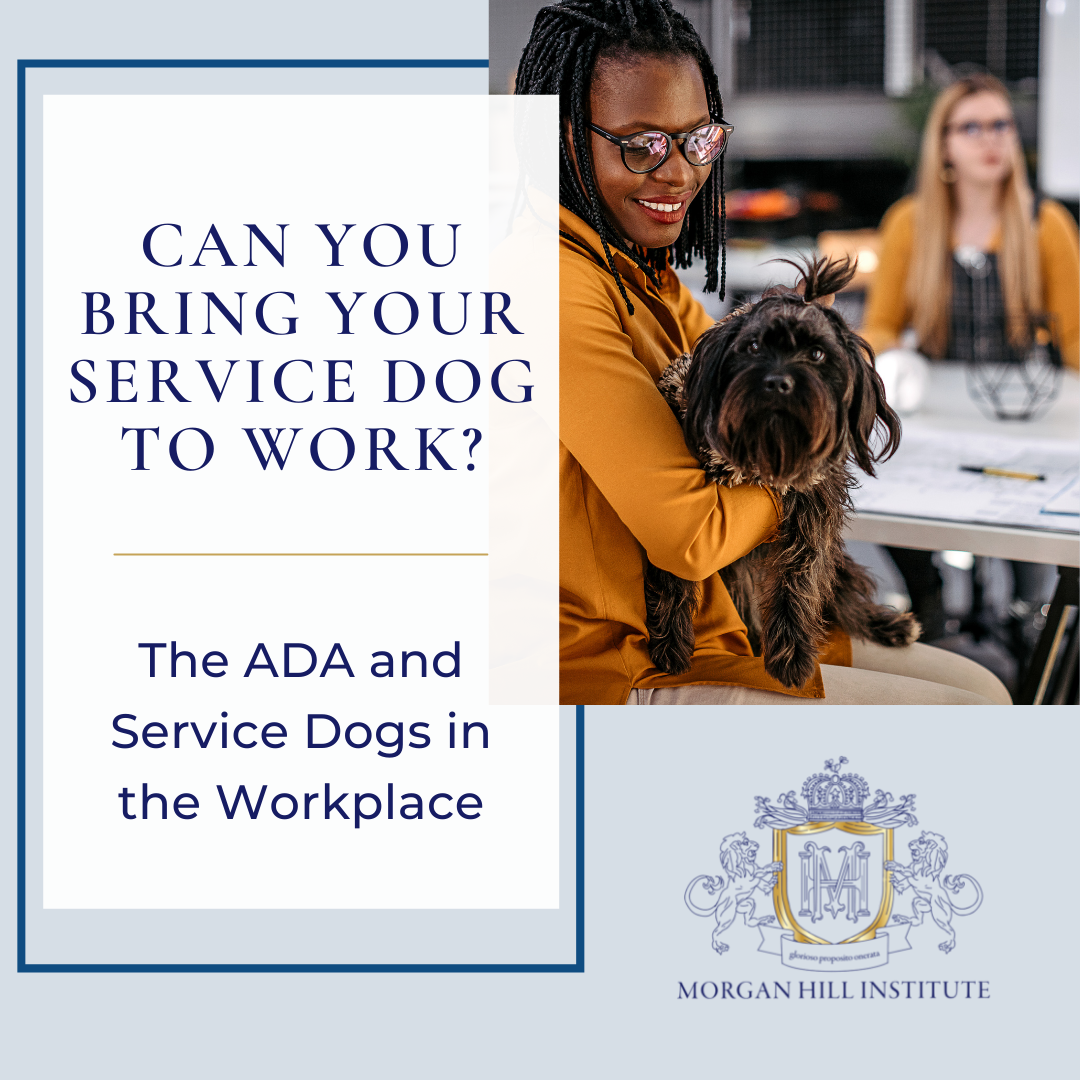What Do Psychiatric Service Dogs Do? What You Need to Know About Psychiatric Service Dogs
What is a psychiatric service dog?
Psychiatric service dogs (PSD) are a specific type of service animal trained to help individuals with a psychiatric condition function more fully. Instead of providing emotion support like an emotional support dog, a PSD performs tasks to enable to handler to function in ordinary ways. The handler must have a prescription from a licensed mental health professional certifying that the dog is needed to assist with a major life task.
Common conditions that are helped by a PSD include anxiety, depression, bipolar disorders, panic attacks, social phobias, agoraphobia, obsessive compulsive disorder, and post-traumatic stress disorder. The intensity of symptomology must reach the threshold of interfering with at least one major life activity. For example, having a social phobia so severe the individual is unable to go shopping for groceries without the use of a service dog. The service dog allows the handler to perform tasks that they would otherwise not be able to do.
It’s important to note that many people experience symptoms of depression, stress, or anxiety during their lifetimes. Unless they rise to the level of interfering with a major life activity and have been diagnosed by a treating profession, they are not considered disabilities and would not qualify the individual for a service animal.
What Are Some Common psychiatric service dog Tasks?
The specific tasks a PSD is trained to do will depend on the needs of the individual handler. The barrier may be directly caused by the mental health condition (such as fear of public spaces) or indirectly caused by treatment for the mental health condition (such as dizziness as a side effect from medication).
Common tasks for a PSD include:
Waking the handler up in the morning for work
Waking the handler up from a nightmare
Help the handler calm down when agitated
Get medication and water for the handler
Get help (pressing an alarm to call 911 or barking for help from strangers)
Provide assistance with balance
Provide grounding sensation when agitated or disassociating
Provide tactile stimulation to handler
Training a Psychiatric Service Dog
All service dogs are individually trained to perform tasks or work that mitigate the handler’s disability condition. The dog is typically trained by the handler under the guidance of a professional dog trainer. Dog organizations are increasing offerings to assist with training. Any breed or size dog can be used as a PSD under the ADA.
Service dogs are trained to do tasks that are essential to the handler, that the handler is unable to do for themselves due to their condition. For example, a person taking medication that causes severe drowsiness or has a condition that causes hallucinations may not hear a smoke detector going off. The dog can be trained to persistently signal the individual until the handler wakes up or even lead the handler away from the fire.
There is no legal requirement for tracking or logging training sessions with a service dog, but as a best practice it is recommended to keep some type of training record. If the handler ever faces an issue that leads to a courtroom hearing, arbitration, or mediation, it is important to be able to provide clear evidence that the dog was trained before the incident occurred. Occasional pictures and/or videos can also be helpful, as well as receipts for any trainer costs.
Accessibility
Psychiatric service dogs (just like all other service dogs) are allowed public access normally afforded to a person without a service dog, regardless of health codes or business policies. The dog must be well-behaved and not interfere with normal operations. The handler must be in control of the dog at all times.
All service dogs may be taken into public access places such as restaurants, stores, theaters, public transportation, motels/hotels, churches, amusement parks, and hospitals. The handler cannot be charged an additional fee because of the service dog. The handler and dog cannot be intentionally separated from other patrons.
The Fair Housing Act allows tenants to have service animals in that housing even if the location has a no pets policy.
The Air Carrier Access Act allows service dogs to travel in the cabin with the handler. To avoid problems on the day of travel it is advisable to contact the airline in advance to let them know a service animal will be accompanying the passenger.
Note: Service dogs-in-training are not protected by the same guidelines as service dogs in all states.
Secondary Benefits to haing a psychiatric service dog
Owning a dog provides general emotional and physical benefits for the handler, whether the dog is a trained service animal or a family pet. Researchers have identified several benefits to owning a dog in general.
Reduced depression: Dogs are calming and familiar companions that reduce stress and anxiety. This can lead to higher levels of serotonin and dopamine, which can regulate mood, reduce perception of pain, and increase emotional connection to others.
Increased sense of security: Dogs have a natural pack mentality that includes protection. They will alert to strange or unusual things in the environment. A service dog is not a guard dog and is trained not to threaten or attack others. However, having a large dog with a person can be a deterrent to people who might otherwise have seen a person with a disability as an easy target for mugging or worse.
Lower blood pressure: Having a dog helps lower spikes in blood pressure that happen when a person experiences stress. A review of studies published between 1950 and 2019 showed documented health benefits of lower blood pressure levels and improved tolerance for stress when the individual had a dog.
Reduced feelings of loneliness: Unpleasant feelings of loneliness and isolation can be reduced when a dog is present. Dogs provide unconditional positive regard for the handler. Even when friends and family are pulled back or are unavailable, a dog will still be there. Many dog owners report talking to the dog as though it were a person. Feelings and fears can be shared without concern for judgment or rejection from a dog. Talking about emotions can help reduce their negative impact and improve mood.
Increased social interaction: Having a dog makes an individual more approachable by strangers and helps start conversations, leading to an easier time making new friends.
Reduced stress: The simple act of petting a dog has multiple health benefits, including lowering blood pressure, slowing heart rate and breathing, and relaxing muscle tension. Scientists noted that 10 minutes of petting a dog had a significant reduction in the stress hormone cortisol.
It is important to note that owning a dog comes with added challenges in addition to the many listed benefits. They need outdoor space to play and run, typically a fenced-in backyard. Even service dogs need time off to relax and play. Dogs also make messes, get sick, and need to go the veterinarian. Owning a dog, whether a service animal or as a pet, is serious commitment. Individuals should carefully consider the pros and cons of having a dog before adding one to the family.
common service dog questions from the public
When many people hear “service dog,” they immediately envision a golden retriever leading a person with a visual impairment or assisting someone in a wheelchair. This stereotype can cause some potentially uncomfortable social situations for several reasons.
Handlers with invisible disabilities such as a mental illness may be challenged by strangers about why they have a service dog or accused of using a fake claim to allow the handler to bring a pet into a public place. The social stigma of a mental illness may make the handler uncomfortable disclosing the reason they have a service dog. Members of the public may feel compelled to ask questions or challenge the legitimacy of the service dog.
It is important to note that the handler is not required to disclose details of their health status. If a business owner approaches the person with a service dog they can only legally ask two questions to verify the dog is protected under the Americans with Disabilities Act (ADA): (1) is the dog a service animal required because of a disability and (2) what work or task has the dog been trained to perform.
Members of the public may also see a service animal as being like any other dog and approach to pet or offer it treats. The handler will need to correct their behaviors and politely explain that this is a working animal, not a pet.
These situations can happen multiple times a day, every day. The handler will need to be comfortable and patient with the public.
Clinical Studies
Researchers Janice Lloyd, Laura Johnston, and Julia Lewis noted in Frontiers in Veterinary Science that psychiatric service dogs are beneficial in measurable ways. Having a PSD decreased use of emergency services by 46% primarily due to fewer suicide attempts, less need for hospitalization, and less use of medication. PSDs increased both their handlers’ attendance at therapy appointments and interactions with others; the PSD was often described as increasing the handlers’ confidence to handle social settings.
A Survey of Mental Health Patients Utilizing Psychiatric Service Dogs indicates that PSD are commonly used for mood and anxiety disorders. The majority of handlers with these disorders reported having fewer symptoms after getting a PSD.
Summary
Having a service dog brings the handler multiple benefits in general health, emotional health, and social interactions. It can be a gateway to making new friends but may lead to unwelcome interactions with curious strangers. Overall, having a psychiatric service dog is a benefit to people with mental health challenges.
disability rights and service dog expert melissa kaekel
Morgan Hill Institute’s Melissa Kaekel is an expert on disability rights in the workplace and service dogs. Interested in having Melissa consult for your organization or speak to your group, be a guest on your podcast, or be an expert source for a press piece? Learn more about consulting and speaking services here.







